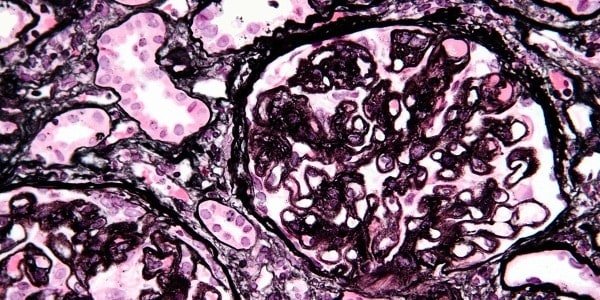Glomerulonephritis

Description
Glomerulonephritis is an inflammation of the small filters in the kidneys /glomeruli/. They remove excess fluid, electrolytes, and waste from the blood, thus forming urine.
Also, glomerular disease can manifest itself with sudden inflammation – acute form, or occur gradually – chronic.
If the disease appears by itself, it is referred to as primary. If another clinical condition such as diabetes or lupus is the cause, then it is defined as secondary.
Severe or prolonged inflammation affecting the glomeruli can damage the kidneys.
What are the symptoms?
Clinical manifestations of the disease are determined depending on its form – acute and chronic. The first sign that something is wrong can appear during a routine urine test.
The most common symptoms are:
• Pink or car-colored urine, due to the presence of red blood cells in it /hematuria/;
• High blood pressure – hypertension;
• Fluid retention – noticeable swelling of the face, hands , legs and abdomen;
• General fatigue from anemia or due to kidney failure;
If you have any of the above symptoms, seek medical attention as soon as possible.
What are the causes?
Many diseases and conditions can cause the glomeruli to become inflamed. However, in some cases no cause can be identified.
Clinical conditions that can cause inflammation of the glomeruli:
• Poststreptococcal glomerulonephritis – inflammation of the small filters of the kidneys can develop 1-2 weeks after recovery from a streptococcal infection in the throat or less commonly from a skin infection /impetigo/.
To fight the bacterial infection, the immune system produces additional antibodies, which may end up in the glomeruli and cause their inflammation.
Children are at great risk, but their recovery period is also shorter.
• Bacterial endocarditis – it is possible for bacteria to enter the blood and enter the heart tissue, causing an infection in one or more of the heart valves.
The risk of developing this clinical condition is greater in people with a heart defect such as a damaged or implanted artificial valve.
Bacterial endocarditis provokes the development of inflammation of the glomeruli, but the exact relationship between the two conditions has not been established.
• Viral infections – the HIV virus, hepatitis B and C can cause glomerulonephritis;
• Lupus – the chronic inflammatory disease can affect multiple organs and systems of the body, most commonly the skin, joints, kidneys, blood cells, heart and lungs.
• Goodpasture syndrome – a rare immunological lung disease that can mimic pneumonia, causing hemorrhages in the lungs as well as inflammation of the glomeruli;
• IgA – nephropathy – characterized by repeated attacks of hematuria, this primary form of glomerular disease is due to the deposition of immunoglobulin A in the kidneys. This pathology can progress for years without noticeable symptoms.
Treatment of glomerulonephritis
When any kidney disease is diagnosed doctors advise the following:
• Limiting salt intake to prevent or minimize fluid retention, resulting edema and hypertension;
• Keeping the weight within healthy limits;
• Controlling blood sugar levels in concomitant diabetes;
• Quit smoking;
• Reducing the consumption of foods containing proteins and potassium, thereby reducing the accumulation of waste products in the blood.



